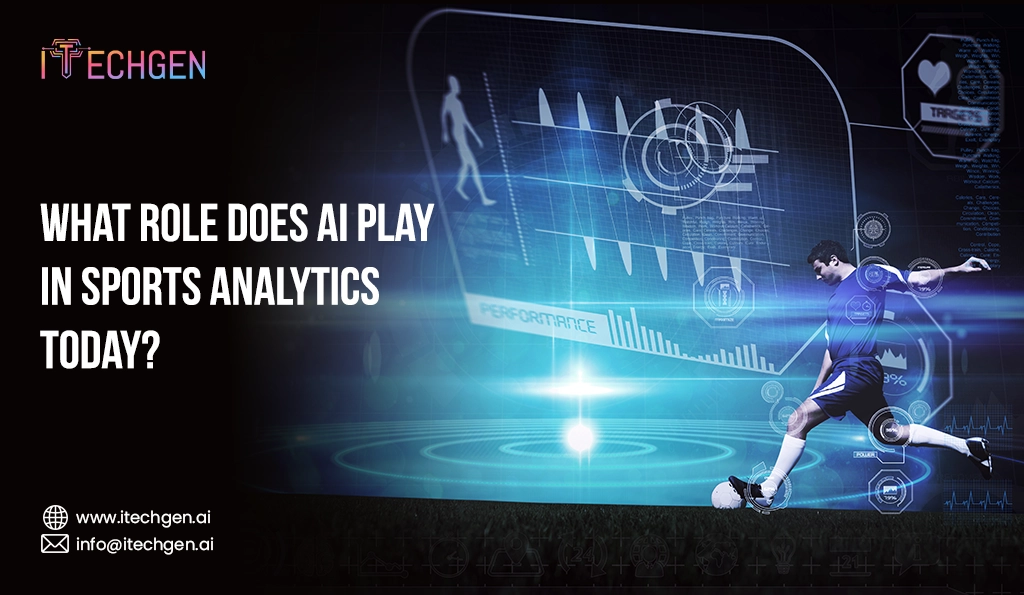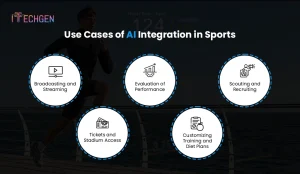
Over nearly 20 years, AI integration in industries has completely changed how we normally watch and evaluate everything. In sports, artificial intelligence (AI) and machine learning development benefit performers, broadcasters, sponsors, and spectators by offering real-time data.

Today, AI is more than about analyzing data; it’s a strategic weapon helping sports teams outshine each other, enhance player health and performance, and redefine fan experiences. Due to its accuracy and benefits, this technology is guaranteed to have a bright future in sports. It has been transforming the sports industry by getting deeper insights, enhancing performances, and influencing the future of the game.
In this blog, let’s explore the crucial role AI plays in the sports industry. We’ll also discuss some of the key applications of the same, highlighting the importance of AI development services in today’s evolving market.

AI and machine learning development has redefined the game both on and off the field, empowering smarter strategies, immersive fan experiences, and futuristic sports management solutions.
By improving photography, transmission, commentary, and audience-specific visual components, artificial intelligence (AI) enhances the streaming and broadcasting experience. This makes it possible for broadcasters to provide fans who watch from home rather than going to games in person with excellent coverage.
Large volumes of data are processed by AI to examine important facets of individual and team performance, including passes, formations, goals scored, and pivotal moves made throughout a match. Strengths, weaknesses, and tactics for upcoming games are identified with the use of this analysis.
AI uses machine vision to track player movements, giving recruiters comprehensive information about performance measures. In order to maximize value and improve team performance, this aids clubs in making well-informed decisions on the acquisition, development, or sale of players.
By enabling spectators to enter without actual tickets, AI-powered facial recognition technology simplifies stadium admission. This innovation reduces waiting times, avoids congestion, and creates a safer, post-pandemic-friendly environment.
By analyzing overall performance data, AI helps coaches develop individualized training schedules and dietary guidelines for players. It provides customized advice to help athletes stay at the top of their game and get greater results.
AI is a tactical tool that helps teams outperform their rivals, enhance player performance and health, and redefine what it means to be a fan. Here are some of the critical applications of AI development services in sports:
Athletes used to rely on their coaches’ expertise to help them perform better. AI is now elevating it to a completely new level. During training games, a lot of data is gathered about athletes’ running speeds, endurance levels, and even reaction times. All of this data can be handled by an AI system. Thus, by examining these metrics, AI develops customized training programs for every athlete that maximize their strengths and concentrate on their weaknesses.
For instance, a sprinter may want to focus on increasing speed during the first few meters. But in hoops, he/she must perform exercises that enhance their agility and spatial awareness. AI systems can pick up this kind of subtlety more quickly and accurately than a human teacher. In this manner, athletes can perform to the best of their abilities without overtaxing themselves or suffering injuries.
Oftentimes, injuries occur in professional sports. Identifying and preventing injuries before they occur is one of the most interesting applications of AI. A team can utilize AI algorithms to monitor a person’s biomechanics as they move their joints and strain their muscles. Prior to symptoms appearing, it might search for patterns or anomalies that indicate an injury.
For example, an AI might detect a slight variation in the amount of strain a soccer player places on their knee joint and alert the coaches or medical personnel. As injury became severe enough to force the player to miss games, the coach could either give them rest or perform workouts to aid in their recovery. AI also monitors the effectiveness of healing and can advise you on necessary adjustments to a training program.
This proactive method helps the teams keep track of their players’ workloads so that they don’t get too tired and they can perform at their best during important events like tournaments and playoffs.
Aligning with corporate social responsibility objectives, AI supports sustainability efforts by optimizing stadium energy consumption, enhancing logistical efficiency, and minimizing waste.
You have less than a second to decide on professional sports. The AI systems track player locations, ball locations, possession of the ball, and distances from the goal using real-time data during gameplay. Every motion is captured by cameras, and AI can analyze the data in real time to assist coaches in modifying their strategies.
For example, AI may see that a basketball player consistently receives positive looks during a game. The coach can then use this to change the defense’s strategy. On the contrary, share this data with the opposite team so they can use it to get a competitive edge.
AI is capable of tracking much more than just saves, assists, and goals. You may examine in detail how AI is now used for sports data thanks to its advanced metrics. AI can be used in soccer to monitor a player’s touch, distance run at high speed, and defense-supporting abilities.
Coaches and analysts can examine player’s actions more closely and identify their strengths and weaknesses with these metrics, which might not be apparent with older statistics. This degree of in-depth analysis is crucial for developing game plans. Additionally, coaches can now make informed decisions on when to switch up the players or make adjustments.
One of the most interesting applications of AI integration in sports is the ability to predict future results. Multiple factors like past performance, the weather, and even the mental state of a player, can help us predict the outcome of a game with precision. Fans and sports bettors are not the only ones who can benefit from this.
Additionally, teams utilize it to determine how to better prepare for their opponents. For example, AI may be able to predict that a football team will be the most exhausted and less competitive during the fourth quarter. This weakness might then be used by the other team to alter their strategy.
Artificial intelligence and machine learning development are an emerging trend in the sports industry. From optimizing team strategies to enhancing fan experiences and ensuring player health and safety, AI can do everything. By leveraging AI’s capabilities, organizations can gain deeper insights, streamline operations, and make informed decisions that were previously not possible. With the adoption of AI development services, we can now expect even greater transformations that will reshape the way sports are played, managed, and enjoyed by audiences worldwide.

At iTechGen, our team offers world-class AI and machine learning development services tailored to meet the unique needs of clients seeking innovation and competitive advantage in the sports industry. We empower sports organizations and tech partners to harness AI’s full potential. Reach out to us today and discuss your project in detail.

Pankaj Arora is the Founder & CEO of iTechGen, a visionary leader with a deep passion for AI and technology. With extensive industry experience, he shares expert insights through his blogs, helping businesses harness the power of AI to drive innovation and success. Committed to delivering customer-first solutions, Pankaj emphasizes quality and real-world impact in all his endeavors. When not leading iTechGen, he explores emerging technologies and inspires others with his thought leadership. Follow his blogs for actionable strategies to accelerate your digital transformation and business growth.
View More About Pankaj Arora